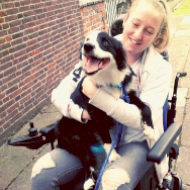
Young Gloucestershire charity receives £20,000 funding from the Kennel Club Charitable Trust.
Young people struggling with mental health issues in Gloucestershire are set to receive the support of a trained dog therapist, thanks to funding received from the Kennel Club Charitable Trust.
The Young Gloucestershire charity received £20,900 from the Trust to enable them to employ a trainer for Border collie, Buddy. Together, Vanessa Radwell and Buddy will help young people from disadvantaged backgrounds develop the tools and skills to build a better life.
The charity hopes Buddy will help to build confidence in young people by helping them in different ways. For example, helping anxious children leave the house by going for walks together and improving the confidence of anxious readers.
It is also hoped that Buddy will encourage young people to share and connect with their therapist in situations that are difficult to discuss. Tom Saunders, operations manager at Young Gloucestershire, explains:
“Although Buddy is yet to start his official therapy training with his new handler due to Covid-19, his presence in the community has already had a positive impact on many of the young people we are working with. He has spent a lot of time on one-to-one ‘walks’ with young people who have been facing traumatic experiences, struggling with mental health, anger issues or worse.
“Many of those who participate in our personal development programmes credit Buddy with their willingness to continue their course. I have watched young people go from tearful, agitated and worried to relaxed, engaged and calm in Buddy’s presence.”
Vanessa and Buddy have begun training in recent days to coincide with Mental Health Awareness Week. The funding forms part of the Animal Assisted Intervention Project, highlighting the impact of dogs on mental health.
Bill Lambert, spokesperson for the Kennel Club said: “Dogs provide us with love, loyalty, companionship without any judgment. Just by being around, dogs can alleviate stress, anxiety, depression and loneliness.
“The mental health support that dogs provide is now more important than ever, as we face a global pandemic, leaving many people feeling isolated and anxious.”
Image (C) Young Gloucestershire.



 The latest
The latest